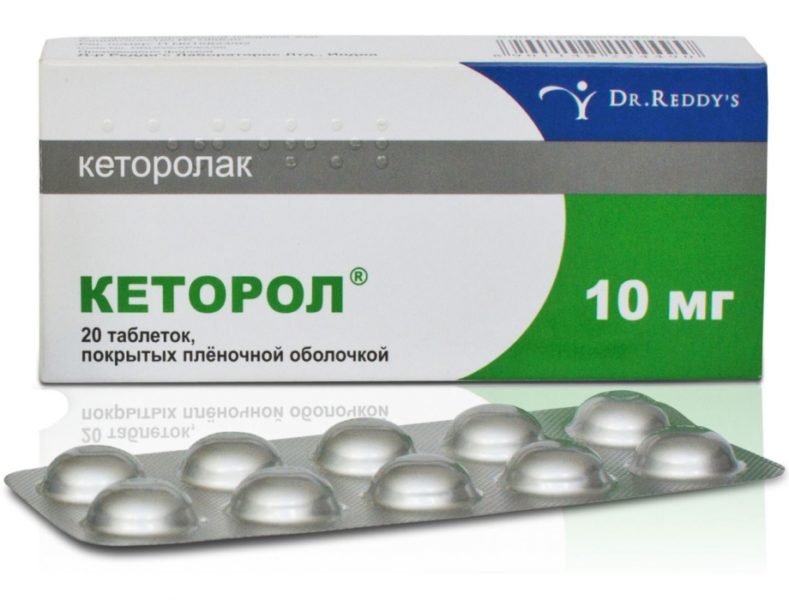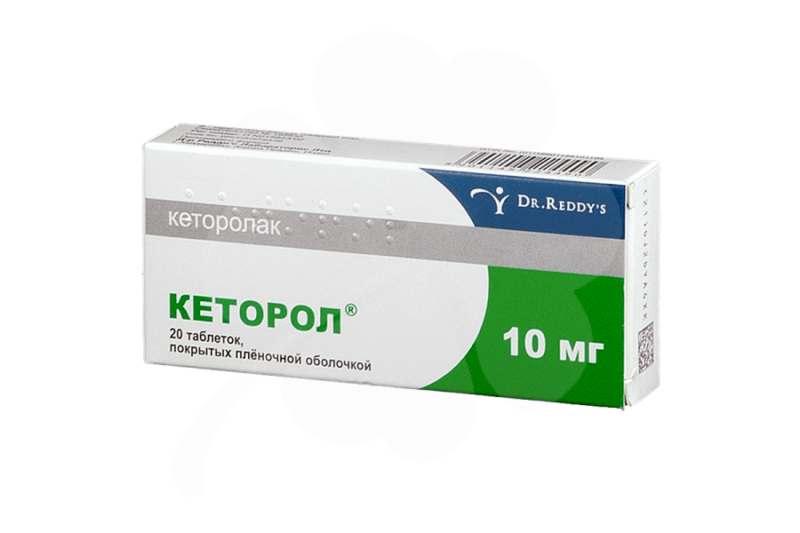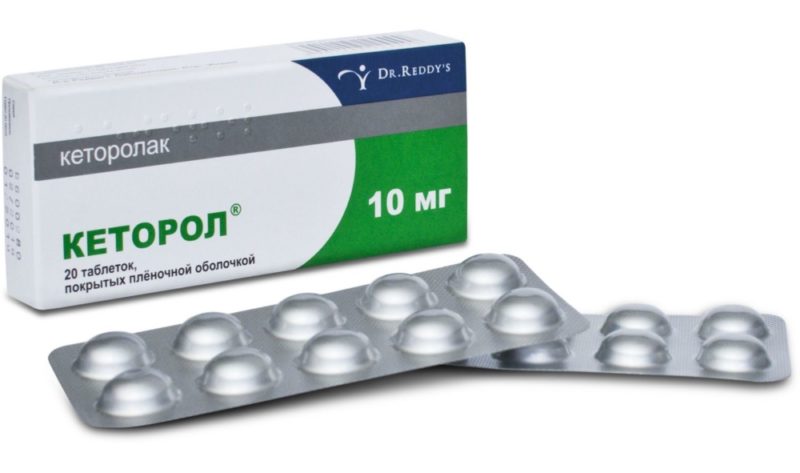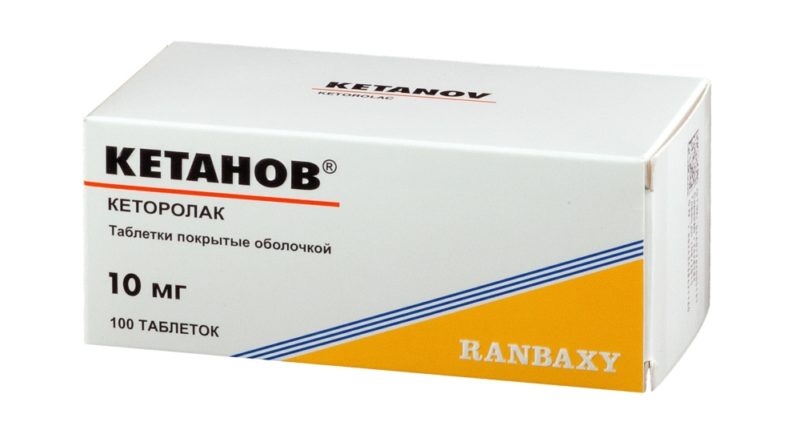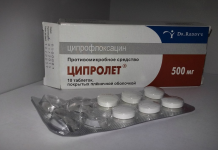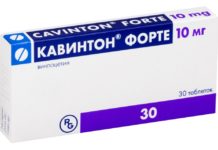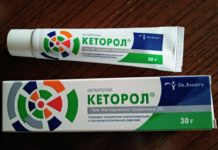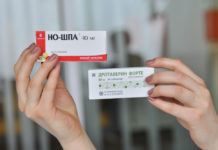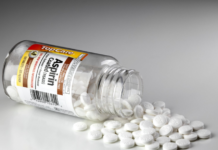With pain syndrome of various etiologies, it is important to choose the optimal drug that will effectively relieve the symptom and not harm health. A popular medicine is Ketorol tablets. The drug belongs to non-steroidal anti-inflammatory drugs, therefore, it can cause negative reactions with prolonged use.
Material Content:
The composition of the drug
Nonsteroidal anti-inflammatory drug (NSAID) Ketorol is a medicine based on ketorolac tromethamine. Each tablet contains 10 mg of active substance.
The composition also contains cellulose, starch, magnesium stearate and silicon dioxide. Each tablet is covered with a thin film membrane that contains dyes and hypromellose.
The peculiarity of the tablets is their color - green, with the letter "S" on one side. This allows you to conveniently store the medicine in tablets, without the risk of confusing Ketorol with another drug.
Pharmacological properties and pharmacokinetics
Ketorol is a non-narcotic painkiller pill. The medicine has an analgesic, anti-inflammatory and moderate antipyretic effect. The active substance belongs to peripheral analgesics, as it inhibits the synthesis of prostaglandins.
The tablet begins to act 45-50 minutes after administration. The medicine is excreted mainly in the urine.The half-life is about 5.5-6.5 hours, depending on the age of the patient.
The absorption rate decreases with a diet rich in fatty and heavy foods, but taking antacids does not affect the effect of the drug.
What Ketorol tablets help from
The main indication for use is pain of moderate intensity. The medicine can be taken to eliminate toothache. An anti-inflammatory and analgesic drug is used to treat arthritis and rheumatic pain, as a means of symptomatic therapy. Another indication is postoperative pain. The drug is used in a short course: it is not intended for systematic administration.
Instructions for use and dosage
When you start taking Ketorol, the dosage should be agreed with your doctor. The universal dosage regimen given in the instructions is one tablet every 6 hours. The time between taking therapeutic doses can be reduced to four hours in the event of a resumption of pain. The maximum daily dosage is 40 mg of the drug or 4 tablets.
The tablet is taken orally with food or immediately after, washed down with clean water. The drug can not be taken for more than a week. If after this period the pain does not go away, you should consult your doctor about the appointment of another drug.
During pregnancy and lactation
The drug should not be taken during pregnancy because of the risk of developing cardiovascular pathologies in the fetus. During labor, the medicine is contraindicated, as it can provoke bleeding in the mother and child.
The drug should not be taken during lactation, since the active components penetrate into breast milk and can adversely affect the baby.
In addition, women should take into account that the drug negatively affects fertility and can become an obstacle to conception. In this regard, Ketorol tablets should not be taken during pregnancy planning.
Drug interaction
Before you start taking, you should carefully study the composition of the Ketorol tablets and the instructions for use, paying special attention to the section of drug interactions.
- The medicine should not be taken with other agents of the same group because of the risk of potentiation of systemic side effects.
- Tablets are incompatible with lithium and cyclosporine.
- When taken with furosemide, it should be borne in mind that the therapeutic effect of the diuretic decreases by about 20%, so it is advisable to consult a doctor about changing the dosage regimen.
- The drug is prescribed with caution in patients with heart failure who take cardiac glycosides. Ketorol may decrease the effectiveness of antiarrhythmic drugs.
- With hypertension, it is necessary to adjust the dosage and dosage regimen of antihypertensive drugs, since NSAIDs reduce their therapeutic effect, which can lead to jumps in blood pressure.
- When taken with ACE inhibitors, it is necessary to control the work of the kidneys.
- When taking NSAIDs with tacrolimus, the nephrotoxicity of this drug increases.
- Ketorol should not be combined with glucocorticosteroids in tablets due to the risk of peptic ulcer and stomach bleeding.
- Admission with antiepileptic drugs in isolated cases can provoke an attack of epilepsy.
- Painkillers increase the negative effects of psychotropic drugs, increasing the risk of hallucinations and delusions.
If the drug is prescribed by a doctor, you should inform him about all the medicines that the patient takes periodically or regularly.
Ketorol Compatibility with Alcohol
The instructions do not give precise instructions on the interaction of tablets with alcohol, but doctors recommend abandoning the use of alcohol during treatment. Such a combination theoretically increases the burden on the kidneys and increases the half-life of the drug from the body. In addition, during the treatment of any disease, alcohol is contraindicated, as it distorts the clinical picture.
Contraindications, side effects and overdose
The drug has an impressive list of contraindications.
These include:
- gastrointestinal bleeding;
- exacerbation of peptic ulcer of the stomach and intestines;
- intolerance to acetylsalicylic acid;
- asthma;
- decompensated heart failure;
- bronchospasm;
- risk of bleeding after surgery;
- moderate and severe renal failure;
- liver failure;
- cerebrovascular bleeding;
- dehydration;
- pregnancy and lactation.
The drug is prescribed with caution in patients with hypertension and heart failure. The limitation is due to the fact that the medicine can provoke fluid retention in the body and cause swelling.
Patients older than 60 years with cardiovascular disease should take the drug under the supervision of a doctor because of the risk of serious side effects. Children under 16 years of age are not prescribed a medicine.
In case of blood coagulation, the drug is not recommended. In addition, it may distort the results of a blood test.
Painkillers should not be taken before surgery because of the risk of bleeding during surgical procedures.
Possible side effects:
- exacerbation of peptic ulcer;
- gastric bleeding (up to death);
- dyspeptic disorders;
- anxiety syndrome;
- blurred vision;
- depressed mood;
- drowsiness and breakdown;
- migraine and vertigo;
- violation of the water-electrolyte balance;
- dysuria;
- jaundice;
- dyspnea;
- bradycardia;
- arterial hypertension;
- swelling.
In sensitive people, there is an inhibition of the activity of the nervous system while taking NSAIDs. This is manifested by drowsiness, loss of strength, dizziness and worsening concentration. In such cases, it is necessary to abandon work that requires extreme attention, and driving a car until the end of the course of taking the medicine.
With intolerance to the active substance, urticaria, erythema and itching of the skin are observed. In this case, the reception must be stopped immediately. Among the side effects are severe allergic reactions, angioedema and anaphylactic shock. Such conditions require urgent medical attention.
An overdose is dangerous inhibition of the activity of the nervous and cardiovascular systems. This is manifested by severe headache, hypertensive crisis, tachycardia, convulsive seizures, fainting is possible. Repeatedly exceeding the daily dosage is potentially dangerous for the development of acute renal failure and internal bleeding, which can lead to death. In case of an overdose, immediately rinse the stomach and induce vomiting, then take activated charcoal. To speed up the removal of the drug from the body, it is necessary to increase the consumption of pure water - this will help provoke frequent urination. If after an hour your well-being does not improve, you must call an ambulance. If convulsive seizures occur, you should immediately contact a medical institution.
Analogs
A complete analog of Ketorol is the popular Ketanov drug. It contains the same active substance in a dosage of 10 mg in one tablet. An equivalent substitute will be the drugs Ketokam, Dolak, Ketorolac. All of these drugs have approximately the same cost.
If allergic reactions occur, you should consult your doctor about the selection of an analogue with a different composition, but with the same therapeutic effect.
Despite its high effectiveness, Ketorol tablets are unsafe, so you need to take them with caution. In case of mild pain, it is advisable to replace the medicine with more gentle analgesics. If the doctor prescribed Ketorol, the duration of treatment should not exceed 7 days.


